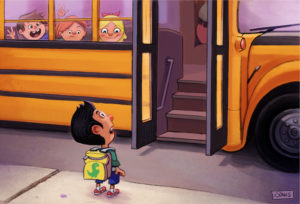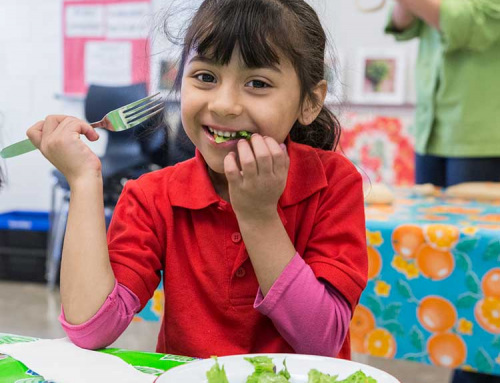After summer months of staying up late, zoning out in front of the TV or video screen, running wild outside, and eating snacks throughout the day, kids are in for a big adjustment as they head back to school. Most children need help transitioning back into a routine with deadlines for a successful start to the school year. It’s also a good time for kids to visit the pediatrician, dentist and eye doctor to make sure their health makes the grade.
Read on for some tips to get kids on track for a healthy start to the school year…
1. Sleep Routine:
Going back to school means an end to staying up late. To help your child transition back to waking up early, Dr. Warren Seigel, Chairman of Pediatrics at Coney Island Hospital in New York, says it’s important to establish a new sleep routine. “Start with going to bed one hour earlier every night and waking up early until the new routine is established,” he states. “It needs to be done a week or two before going back to school, not the night before school starts.”
The National Sleep Foundation provides guidelines for the amount of sleep children should get at different ages. They suggest kids between the ages of 3 and 5 get 10 to 13 hours of sleep a night; ages 6 to 13 need 9 to 11 hours of sleep; and teens 14 and older should get 8 to 10 hours of sleep a night.
Studies have shown that the glowing light from cellphone and tablet screens can disrupt sleep cycles, so make sure kids put electronic devices away well before bedtime.
According to Seigel, “Every pediatrician’s office is chock-full of patients the week before school starts.” Annual checkups should be done by a pediatrician before each new school year to ensure that your child’s medical records and vaccinations are up to date.
The American Academy of Pediatrics has a complete list of vaccination schedules, by age group, posted on its website.
2. Vision Screenings:
Vision screenings are typically done as part of a child’s physical exam, so parents should ask pediatricians about checking their children’s eyesight before school starts.
Having poor vision can sometimes go unnoticed. Kids might not say anything or know that something is wrong with their vision. If your child has to squint or strain to see the front of the classroom, it could show up as headaches during the day, poor school performance or even behavioral problems. Pediatricians can advise when a visit to an optometrist or ophthalmologist is needed.
3. Healthy Eating:
A lot of kids spend the summer eating differently, with fewer rules and more treats, but now’s the time to rein that in. “What kids have been eating July and August should not go in the brown bag for school,” Seigel told CBS News.
Before the new school year starts, get your child back into the habit of eating three regular meals a day: breakfast, lunch and dinner. Multiple studies suggest families sit down for meals together to help the child reset the routine.
4. Wearing a Backpack:
Backpacks full of books and school supplies can put strain on your child’s neck, shoulders and back. Seigel, who is father to 9-year-old twin girls, said that when he tried to lift one of his daughter’s backpacks he thought he was going to get a hernia because it was so heavy. In addition to getting a backpack strong enough to carry a heavy load, he suggests talking with teachers to see if there are ways to lighten the burden.
The American Academy of Pediatrics recommends that kids always use both shoulder straps when wearing a backpack. “Slinging a backpack over one shoulder can strain muscles,” the group states on its website. Also, check with your school to see if they allow rolling backpacks, which may be a good option for students who have a lot to carry.
5. Homework:
The American Academy of Pediatrics suggests creating an environment in the home that is conducive to doing homework. “Children need a consistent work space in their bedroom or another part of the home that is quiet, without distractions, and promotes study,” the group advises.
It’s a good idea to schedule a regular time for homework so the child gets into the routine. Make sure that homework time is free from distractions like TV or other electronic devices.








